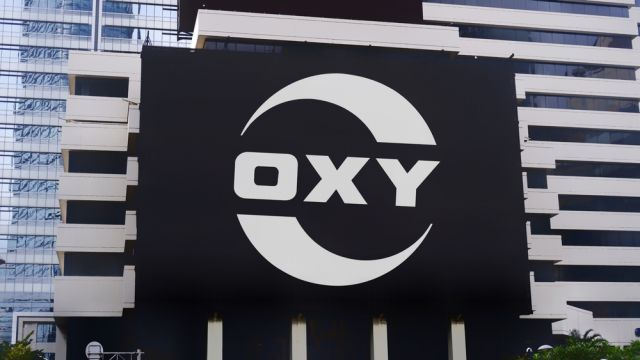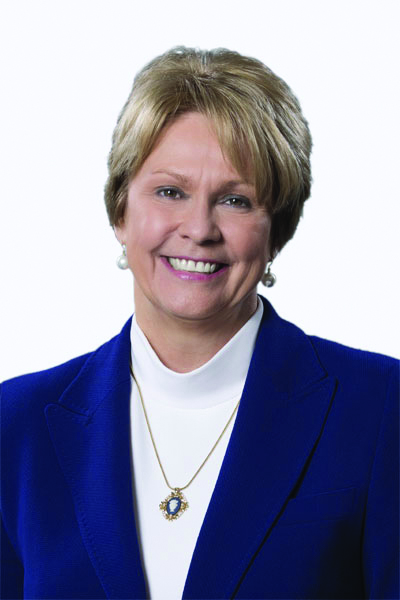
Oxy needs to do more to educate laypeople “and we're trying to do more,” CEO Vicki Hollub said. “That's why I'm here today. That's why I did not want to leave no matter what happened in this building today, because I think we need to get the story out.” (Source: Shutterstock)
Eliminating global oil and gas “is not the right answer,” Occidental Petroleum president and CEO Vicki Hollub said as she came out swinging in a New York forum delayed by climate agitators who took over the live stage.
“It is a sad day for them … that they have nothing better to do with their time,” Hollub said at the Sept. 25 program’s restart an hour later after 10 of the disrupters were arrested and cleared from the Times Square theater.
Posters on X mostly shamed the group, Climate Defiance, when it tweeted a seven-part confession of its work, disparaging Hollub personally and the oil and gas industry generally in addition to bragging that “We made the whole audience of 100s evacuate.”
Hollub said in the resumed program, “Yeah, I don't care what they say about me because what I have the confidence in is that we're doing the right thing.
“… What they're trying to do is get some publicity, raise some funding and continue a business.”
Hollub’s session was taped and posted on YouTube later.
‘Latched onto a narrative’
The session’s moderator, David Gelles, lead editor of the New York Times’ Climate Forward newsletter, which hosted the forum, said people believe the solution to climate problems is “to phase out fossil fuels as rapidly as possible” yet “we’re still burning oil and gas.”

Hollub said, “I find it really hard to understand how we got to where we are that people like you believe that.”
She noted that Gelles visited Oxy’s Stratos direct-air capture (DAC) facility that it is building in West Texas because “you want to understand it.”
But “what's happening is that people have latched onto a narrative,” she said.
“I don't know how it got started, but it has permeated around the world that the only way to mitigate climate change is to do away with oil and gas.
“I don't know how that started because that is not the right answer.”
Instead, she said, “It's the emissions. It's not the fuel source.”
‘You should know this’
Scientists aren’t talking to oil and gas producers, she added.
“What nobody really knows about very much—and we're trying to get the message out—is about net[-zero] power. Had you heard about that before I mentioned it?” she asked Gelles.
He said, “I get a lot of pitches in my inbox …. I don't know if I've heard that particular term.”
She replied, “See, you should know this like the back of your hand.”
Oxy needs to do more to educate laypeople “and we're trying to do more,” she said.
“That's why I'm here today. That's why I did not want to leave no matter what happened in this building today, because I think we need to get the story out.
“We need to help people understand what these possible solutions are. If we could help you understand it, then maybe we could get the right people in the right room and work on these solutions.”
Oxy is invested in NET Power. Net-zero power is generated when natural gas is combusted with pure oxygen. The CO2 and water byproducts drive a turbine. Excess CO2 is recycled in the turbine process, made into physical products, used in CO2-EOR or simply sequestered underground.
‘They hang up the phone’
Full emissions mitigation will take longer than the planet has, though, Gelles said.
Hollub said that will be the case so long as the climate scientists don’t talk to oil and gas producers.
“Have you asked those same scientists at what rate can we get rid of oil and gas with new ways to generate the products that we use … that's practical for aviation, that’s practical for maritime …?
“That is the kind of conversation I want to have with them,” she said.
Hollub suggested that instead of the scientists each talking for 20 minutes all morning and day and she speaking at 5 p.m., “I want to come together with them.”
She added, “They won't even take my phone call. They hang up the phone when they hear that an oil company CEO is calling.
“I want to have those conversations. I want to have those workshops and I want to say, ‘Let's stop attacking each other and let's start working together.’”
‘Who is making that happen?’
Gelles said he would make it a mission for next year’s forum to have a panel including both climate scientists and oil and gas executives.
Hollub asked for an elevated challenge. “Invite them to come. Invite us to come.
“Lock us in a room and tell us you're not letting us out of that room until we come to some conclusion about what the best path could be for this world.”
Climate conversations happen regularly but not with both climate scientists and oil and gas producers, Hollub said.
Several climate-related programs were underway in New York this week, including those hosted by the United Nations and the Clinton Foundation.
“You have all these other organizations and who is making that happen? Nobody's making that happen.
“But we'd be willing to come.”
‘The math does work’
DAC and other carbon-mitigation efforts by Oxy and others mean “we wouldn't disrupt the world and create this need for a lot of new technologies that are going to be incredibly costly—where we're going to have to redesign our infrastructure all around the world.”
It’s simple, she said: There is 50% more CO2 in the atmosphere today than in pre-industrial times.
“So even if we were to shut down oil and gas today, we would need to remove CO2 out of the atmosphere.
“The reality is we can't shut down oil and gas today.”
Gelles said there are those who believe the math of emissions-free oil and gas “doesn’t even come close to adding up today. And they say, ‘How is that not greenwashing?’”
Hollub said, “It's not greenwashing because of the fact that the math does work.”
What’s required is applying hard work, the application of all energy sources and time.
“We're not going to be able to make this happen fast,” Hollub said.
Oxy began construction of its DAC facility before the Inflation Reduction Act (IRA). “We started this project because we were committed to make it happen.”
She added that Oxy’s peers are “starting to recognize that we have technologies that they too should be adopting. So we're starting to influence our industry in a big way.”
The production of energy is a business, so the most effective means of sustainability must be pursued rather than uneconomic, unsustainable ones.
“If we weren't doing it in a way that creates value for our shareholders, we wouldn't be doing it very long. We'd be out of business,” she said.
“So we have to do it in a way that creates value for our shareholders. That's what sustainability is all about.
“If we don't do it, we're not around.”
‘A better place’
Gelles noted the program’s earlier disruption, adding “I’m grateful you’re still here.”
Hollub said, “I deal with it because I know that their goals and their objectives are not aligned with ours.”
The disruptors “are not aligned with the climate scientists. They're not aligned with those of us who are trying to make the world a better place.”
The distraction is counter to efforts to solve for a warming planet. “Rather than work with us to understand it, they want to attack it and shut it down,” she said.
“We at Occidental are a part of the solution. When you have a company our size spending the billions of dollars that we're spending to develop a technology that removes CO2 out of the atmosphere?
“When you have a company like ours that's developing a technology that will create emission-free power by using the natural gas that the United States has—by the way, we have 84 years of natural gas reserves in this country--
“Are we going to waste that because people want to get rid of a hydrocarbon molecule when it's emission-free?
“Does that make sense to anybody?
“When we have the infrastructure to do that, it's the lowest cost way to power with hydrocarbon gases and if it's emission-free, why not use it?
“I don't get why not use it?”
When should the world stop producing oil and gas?
Hollub said, “The day that should happen is the day when we run out of oil and gas because as long as we are offsetting the emissions, there's no reason to stop producing oil and gas.”
Recommended Reading
NOG Spends $67MM on Midland Bolt-On, Ground Game M&A
2025-02-13 - Non-operated specialist Northern Oil & Gas (NOG) is growing in the Midland Basin with a $40 million bolt-on acquisition.
Undrilled but not Unnoticed: White Space Buyers Invest Now for Future Upside
2025-04-18 - Undeveloped, unpermitted acreage lures private equity risk-takers who want in on the mineral and royalty coffers.
Uncoiled: Viper Energy Rides Investor, M&A Wave to New Heights in ‘24
2025-03-25 - With its units coming off an all-time high, Viper Energy made a $4.45 billion Permian acquisition. VNOM units are gaining favor among Wall Street investors. It took more than a decade and several economic downturns to get there.
Prairie Operating to Buy Bayswater D-J Basin Assets for $600MM
2025-02-07 - Prairie Operating Co. will purchase about 24,000 net acres from Bayswater Exploration & Production, which will still retain assets in Colorado and continue development of its northern Midland Basin assets.
US Energy Development Acquires 20,000 Acres in Permian
2025-04-15 - U.S. Energy Development Corp.’s deal to buy 20,000 net acres in the Permian is the largest acquisition in the company’s 45-year history.
Comments
Add new comment
This conversation is moderated according to Hart Energy community rules. Please read the rules before joining the discussion. If you’re experiencing any technical problems, please contact our customer care team.






